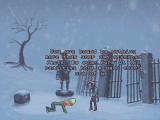MAGS April: Part II
 This is part II of our coverage of the April MAGS competition hosted at the Adventure Game Studio forums. Voting continues until the 17th of May, so you still have some time to check out the entries. The previous part of the article discussed the first four entries to the competition (AGS Footballer Tech Demo, Alphabeta, Dead Hand and Dead Pixels), and the third portion, on Hard Space, Snakes of Avalon and Space Pool Alpha, will be released shortly afterwards, so stay tuned! Today’s part, then, is dedicated to just one game:
This is part II of our coverage of the April MAGS competition hosted at the Adventure Game Studio forums. Voting continues until the 17th of May, so you still have some time to check out the entries. The previous part of the article discussed the first four entries to the competition (AGS Footballer Tech Demo, Alphabeta, Dead Hand and Dead Pixels), and the third portion, on Hard Space, Snakes of Avalon and Space Pool Alpha, will be released shortly afterwards, so stay tuned! Today’s part, then, is dedicated to just one game:
Eternally Us
 Broken rules aside, context is everything with Ben “Ben304″ Chandler and Steven “Calin Leafshade†Poulton’s entry to the compo, Eternally Us. Context-free, the game is, like Steve Ince (So Blonde) calls it, a “beautiful†adventure. For a MAGS entry, then, the game is not only breathtakingly complete but also a fulfilling gaming experience.
Broken rules aside, context is everything with Ben “Ben304″ Chandler and Steven “Calin Leafshade†Poulton’s entry to the compo, Eternally Us. Context-free, the game is, like Steve Ince (So Blonde) calls it, a “beautiful†adventure. For a MAGS entry, then, the game is not only breathtakingly complete but also a fulfilling gaming experience.
The game is also yet another extension to Chandler’s formidable repertoire – a constant stream of short, self-contained adventures – that broadly discusses the same primary motifs, vehicles and themes, in many ways tying his output down into a more coherent whole. Conversely, Poulton is best-known for his well-esteemed (though also controversial) The McCarthy Chronicles.
 Ostensibly an entry point into the relationship of two soulmates – Amber and Fiona – spending a beautiful afternoon out in the park, the game begins in subdued and relaxing tones. It also very, very quickly degenerates into a discussion of emotional distress.
Ostensibly an entry point into the relationship of two soulmates – Amber and Fiona – spending a beautiful afternoon out in the park, the game begins in subdued and relaxing tones. It also very, very quickly degenerates into a discussion of emotional distress.
In fact, whether it’s the loss of memory or knowledge, teleportation or even planar shift, Chandler has now juxtaposed the real world to a netherworld/spiritual world/otherworld in nearly all of his recent games, including Shifter’s Box, Heed, Hope and Featherweight. The same can be said of Eternally Us. While the game does technically utilize one and the same “room†as far as the concept is defined within the actual AGS engine, it nevertheless proceeds through a series of symbolic locations tied together by the thematic confines of the Kübler-Ross grief cycle. The author himself promised to explain these aspects in the form of a forthcoming post-mortem, so I won’t linger on this further.
The game seems equally informed by the standard dramatic structure of a five-stage play, from exposition to resolution. After all, adventure games have traditionally mimicked the spectators’ viewpoint in their presentation, and Eternally Us actually proceeds to acknowledge this fact.
Poulton’s dialogue utilizes a wildly poetic register, prosaic in a way that borders on the verbose. Let me quote the character of “Hurtâ€:
While the above clearly illustrates Poulton’s effortless lexicon and understanding of genre, these dramatic and overstated sections ultimately make out about 90% of the game and do hamper character-level relatability terribly; where overwritten dialogue in The McCarthy Chronicles is still directly used in the fleshing-out of characters, the stylings here are wasted on secondary and even tertiary characters that leave little mark on the protagonist or the player.
In comparison to Poulton’s previous work, Eternally Us also lacks the concise minimalism of Hope, as well as omits some of the more intricate details and touches of The McCarthy Chronicles, like the titular hero’s untouched revolver; his wish to be able to play the piano and so forth.
Poulton himself characterises his overall enterprise in the following way:
The aims outlined above are, in no uncertain terms, lofty.  For a writer to grow, of course, the utilization of schemas and narrative structures is surely recommendable. That being said, the structural choices here render the primary characters secondary while the narrative, though at the forefront, remains oblique and suffers from being squeezed into its formal constraints.
For a writer to grow, of course, the utilization of schemas and narrative structures is surely recommendable. That being said, the structural choices here render the primary characters secondary while the narrative, though at the forefront, remains oblique and suffers from being squeezed into its formal constraints.
By now, you must have realized there exists quite the rift between the tone of my commentary so far and the actual merits of the production. There is obviously no doubt whatsoever that Eternally Us both looks and plays most excellently, with production values, polish and sheen of incredible calibre for a MAGS project.
The game also sports a wondrous cast of voice actors, with Miranda Gauvin’s performance especially of note, and Poulton’s musical score is similarly neat. Chandler’s background art is equally painterly and atmospheric as usual: Some of the latter-half scenery especially, with animated full-screen falling snow and leaves, begs to be seen in motion; speaking of motion, there is a-plenty of that, too. Only the artist’s obsession with lamps and lamp-posts is beginning to stand out like a bit of an eyesore.
 Again, as outlined at the very beginning of the article, only a ludographic contextualization reveals these gripes, which do not arise much in relation to the compo at hand.
Again, as outlined at the very beginning of the article, only a ludographic contextualization reveals these gripes, which do not arise much in relation to the compo at hand.
In terms of gameplay, Eternally Us is not so light on puzzles as its puzzles are light. I would draw attention to how the game forms no exception to Chandler’s recurring use of kinetic, movement-based puzzles that push the game more into the realm of the interactive novel. In my admittedly superficial and incomplete reportage of Heed I wrote that “[t]here is a definite emphasis on positioning, movement and object statesâ€.
This is not a criticism. However, while the kinetic approach was still extremely novel in Shifter’s Box, and fresh enough in Heed, the issue of repetition is beginning to rear its head: As repeated action forms the solution to most of the puzzles here, more variation would be required for the game to create more of an illusion of a problem-solving game. As is, the term point and click could simply not be any more appropriate.
I would also like to further clarify how I find the game’s failures in the writing department to be ultimately far less about register and more about its actual use. While the game begins in the present day, and looks to be a discussion of banality, it abruptly delves into a more fantastic sphere. Sadly, these two modes, the banal and the symbolic, are ultimately irreconcilable in the game’s fiction: The main character, Amber, takes her predicaments always at face value, never questioning or negotiating her own role. Is there no lingering doubt, at all?
This, in turn, is rather dangerous to the game’s use of location- and character-based symbolism. Consider Shifter’s Box, where planar travel is beautifully motivated by the game’s in-game fiction, or even Poulton’s own The McCarthy Chronicles, which works to avert the obvious trappings of the genres of noir and hardboiled. Perhaps games like Downfall, in their discussions of the human psyche, succeed in part thanks to not relying so closely on structure and form?
Whenever Poulton lets his romantic stylings drop and subsequently allows the characters to shine through, whether cognizantly or accidentally, the game finds just enough time to deliver a fantastic payoff. In this way, the very best portions of the game in my mind are, by far, its beginning and its end.
Chandler, “Ben304,” one of (if not) the most prolific games writers currently working with AGS, can maintain an inhuman pace: Poulton and Chandler’s earlier collaboration, Hope, was completed over a 48-hour span. These men are clearly familiar with the presence of temporal constraint. What I would most like to see at this juncture, however, is for the authors to take a jab at producing a full-length; in short bursts, their games tend to dwell on the same topics each time around. Perhaps their forthcoming project in
All things said, I hope the various references to all these wide-ranging earlier projects as well as the length of this write-up speak for (and, heaven forbid, not against!) Infinite Grace’s excellent contributions to the freeware adventure scene. Again, do not hesitate to cast your vote – there’s still enough time to check all the entries out. Please also remember to check back soon for the final portion of our reportage!



0 Comments
Recommended Comments
There are no comments to display.